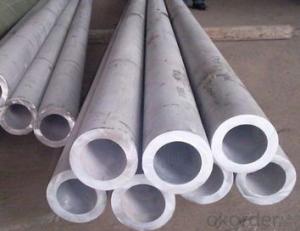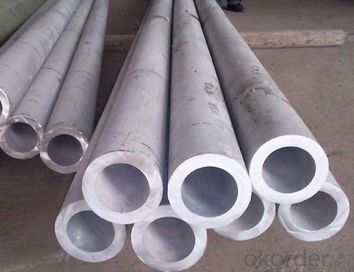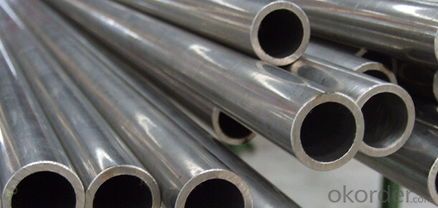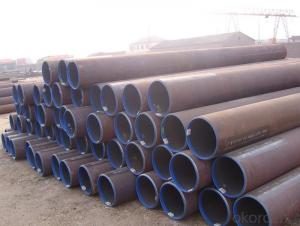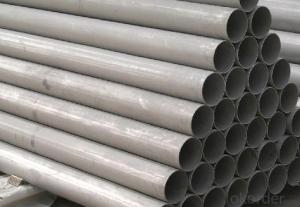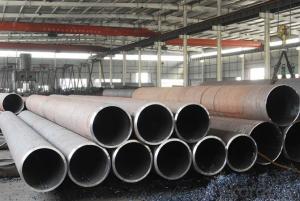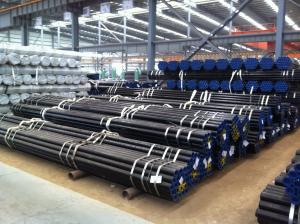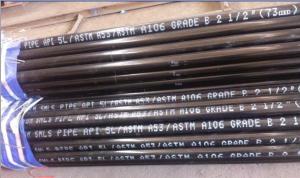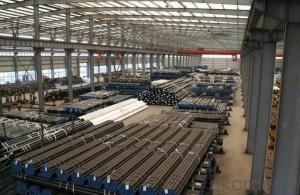Seamless Carbon Steel Pipe API 5L For Oil Application
- Loading Port:
- Tianjin
- Payment Terms:
- TT OR LC
- Min Order Qty:
- 25 m.t.
- Supply Capability:
- 10000 m.t./month
OKorder Service Pledge
OKorder Financial Service
You Might Also Like
Product Description:
1、Structure of Seamless Carbon Steel Pipe API 5L For Oil Application:
Seamless pipe is formed by drawing a solid billet over a piercing rod to create the hollow shell. As the manufacturing process does not include any welding, seamless pipes are perceived to be stronger and more reliable. Historically seamless pipe was regarded as withstanding pressure better than other types, and was often more easily available than welded pipe.
2、Main Features of Seamless Carbon Steel Pipe API 5L For Oil Application:
• High manufacturing accuracy
• High strength
• Small inertia resistance
• Strong heat dissipation ability
• Good visual effect
• Reasonable price
3、Seamless Carbon Steel Pipe API 5L For Oil Application Images:
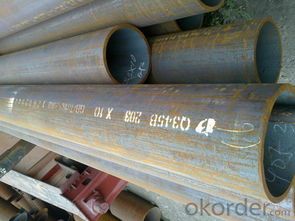
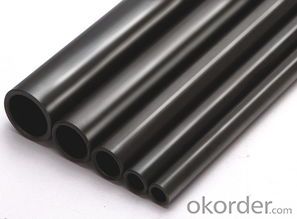
Packaging & Delivery
Packaging Details: | seaworthy package,bundles wrapped with strong steel strip |
Delivery Detail: | 15-30days after received 30%TT |
4、Seamless Carbon Steel Pipe API 5L For Oil Application Specification:
Standard | GB, DIN, ASTM |
Grade | 10#-45#, 16Mn |
Thickness | 8 - 33 mm |
Section Shape | Round |
Outer Diameter | 133 - 219 mm |
Place of Origin | Shandong, China (Mainland) |
Secondary Or Not | Non-secondary |
Application | Hydraulic Pipe |
Technique | Cold Drawn |
Certification | API |
Surface Treatment | factory state or painted black |
Special Pipe | API Pipe |
Alloy Or Not | Non-alloy |
Length | 5-12M |
Outer Diameter | 21.3-610mm |
Grade | 20#, 45#, Q345, API J55, API K55, API L80, API N80, API P110, A53B |
Standard | ASME, ASTM |
1.Material:20#(ASTM A 106/A53 GRB.API5LGRB,GB),45#,16Mn,10#.
2.Specification range:OD:21.3-610mm,WT:6-70mm,length:6-12m or according to the requirement of clients.
3.Excutive standards:GB,ASME API5L.ASTM A 106/A53,Despite of the above standards,we can also supply seamless steel pipe with standard of DIN,JIS,and so on,and also develop new products according to the requirements of our clients!
4.Surface:black lacquered,varnish coating or galvanized.
5.Ends:Beveled or square cut,plastic capped,painted.
6.Packing:bundles wrapped with strong steel strip,seaworthy packing.
5、FAQ of Seamless Carbon Steel Pipe API 5L For Oil Application:
①How is the quality of your products?
Our products are manufactured strictly according to national and internaional standard, and we take a test
on every pipe before delivered out. If you want see our quality certifications and all kinds of testing report, please just ask us for it.
Guaranteed: If products’ quality don’t accord to discription as we give or the promise before you place order, we promise 100% refund.
②How about price?
Yes, we are factory and be able to give you lowest price below market one, and we have a policy that “ for saving time and absolutely honest business attitude, we quote as lowest as possible for any customer, and discount can be given according to quantity”,if you like bargain and factory price is not low enough as you think, just don’t waste your time.Please trust the quotation we would give you, it is professional one.
③Why should you chose us?
Chose happens because of quality, then price, We can give you both.Additionally, we can also offer professional products inquiry, products knowledge train(for agents), smooth goods delivery, exellent customer solution proposals.Our service formula: good quality+good price+good service=customer’s trust
SGS test is available, customer inspection before shipping is welcome, third party inspection is no problem.
Any question, pls feel free to contact us !
- Q: How can the immersed pipe pile put steel cage into the steel pipe? Which expert to answer?
- Cast-in-place pile for pile machine in place, hammer (vibration), on the edge of immersed tube material, hammer (vibration) side of extubation, and continue pouring concrete, steel cage, continue pouring concrete and extubation to pile.
- Q: Can steel pipes be used for conveying abrasive materials?
- Yes, steel pipes can be used for conveying abrasive materials. Steel pipes are known for their durability and resistance to wear and tear, making them suitable for transporting abrasive substances such as sand, gravel, or chemicals. Additionally, steel pipes can handle high pressure and temperature conditions, further contributing to their suitability for conveying abrasive materials.
- Q: What is the difference between ERW (Electric Resistance Welded) and LSAW (Longitudinal Submerged Arc Welded) steel pipes?
- ERW steel pipes are manufactured using the process of high-frequency electrical current passing through the metal, creating heat that fuses the edges of the steel together. On the other hand, LSAW steel pipes are produced by submerging the steel plate in a welding zone, where an arc is struck and the edges of the plate are melted and fused together. In terms of the welding technique, ERW pipes use electrical resistance while LSAW pipes use submerged arc welding. Additionally, LSAW pipes are typically used for larger diameter and thicker wall thickness applications, while ERW pipes are commonly used for smaller diameter and thinner walls.
- Q: How are steel pipes used in stadium construction?
- Steel pipes are used in stadium construction for various purposes, including the structural framework, support for seating systems, and the installation of plumbing and electrical systems.
- Q: How are steel pipes used in the oil and gas pipeline transportation?
- Steel pipes are used in oil and gas pipeline transportation due to their durability, strength, and resistance to corrosion. They are used to transport crude oil, natural gas, and other petroleum products over long distances. Steel pipes ensure the safe and efficient transfer of these resources from production sites to refineries and distribution centers, ensuring a reliable supply of energy for industries and consumers.
- Q: How are steel pipes used in the transportation of fluids?
- Steel pipes are commonly used in the transportation of fluids due to their durability and strength. They are used to carry various types of liquids and gases, such as water, oil, natural gas, and chemicals. Steel pipes are able to withstand high pressure and temperature, making them ideal for long-distance transportation of fluids. They are widely used in industries like oil and gas, water supply, and sewage systems, providing a reliable and efficient means of fluid transportation.
- Q: What are the typical lengths of steel pipes?
- The typical lengths of steel pipes vary depending on their intended use and application. However, common lengths for steel pipes range from 18 to 24 feet (5.5 to 7.3 meters).
- Q: Galvanized steel pipe, PPR pipe, PE pipe, U-PVC pipe and HDPE double wall corrugated pipe and what is the difference between the characteristics of
- Galvanized steel pipe is a kind of antirust steel pipe, often used in relatively high water supply pipeline or hot water pipeline, the price is higher, can use for at least 30 years;PPR pipe is a kind of polypropylene plastic, which is commonly used in environmental protection plastic pipes, but only suitable for low temperature occasions. It is mainly used for water supply;
- Q: Welded and seamless steel pipe how to distinguish?
- Different uses:Mainly used for seamless pipe or structural parts of the transmission fluid, mainly used in machinery industry, and seamed steel pipe is mainly used in the construction industry, such as water, gas, compressed air and low pressure fluid. But seamless steel tubes are used in all pressure pipes.
- Q: Are steel pipes suitable for food processing facilities?
- Yes, steel pipes are suitable for food processing facilities. Steel is a durable and hygienic material that is resistant to corrosion, making it ideal for transporting food products and maintaining their quality and safety. Additionally, steel pipes are easy to clean and disinfect, further ensuring sanitation standards in food processing facilities.
Send your message to us
Seamless Carbon Steel Pipe API 5L For Oil Application
- Loading Port:
- Tianjin
- Payment Terms:
- TT OR LC
- Min Order Qty:
- 25 m.t.
- Supply Capability:
- 10000 m.t./month
OKorder Service Pledge
OKorder Financial Service
Similar products
Hot products
Hot Searches
Related keywords
